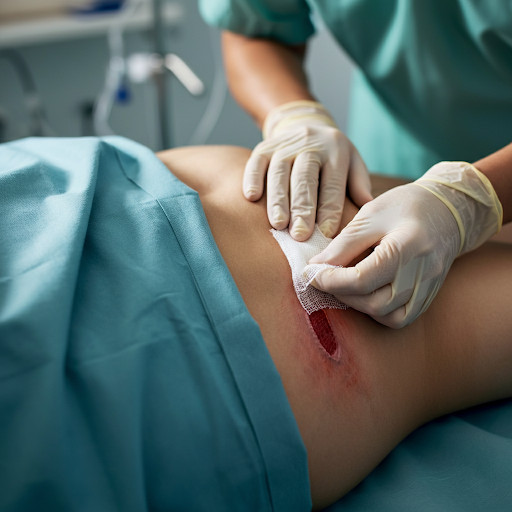Sacrum wounds, also known as pressure ulcers, bedsores, or decubitus ulcers, are injuries to the skin and underlying tissue that develop due to prolonged pressure on the skin. These wounds commonly occur on bony areas of the body, with the sacrum (the triangular bone at the base of the spine) being a particularly vulnerable spot.
Causes of Sacrum Wounds
Sacrum wounds develop when there’s sustained pressure on the skin, restricting blood flow to the area. This lack of blood flow causes tissue damage and eventually leads to the formation of an ulcer. Some common causes include:
- Immobility: People who are bedridden, use a wheelchair, or have limited mobility are at increased risk.
- Friction and Shear: Constant rubbing or sliding against surfaces like bed sheets can damage the skin.
- Moisture: Excessive moisture from sweat, urine, or feces can weaken the skin and make it more prone to breakdown.
- Malnutrition: Poor nutrition can impair the body’s ability to heal and maintain healthy skin.
Who is at Risk?
While anyone can develop a sacrum wound, some individuals are more susceptible:
- Older adults: Aging skin is thinner and more fragile.
- People with chronic conditions: Diabetes, vascular disease, and spinal cord injuries can increase risk.
- Individuals with limited mobility: This includes those recovering from surgery or illness.
Prevention is Key
Preventing sacrum wounds is crucial. Here are some preventive measures:
- Frequent Repositioning: Change positions every 2 hours if bedridden, and shift weight frequently in a wheelchair.
- Proper Skin Care: Keep skin clean and dry. Use moisturizers to prevent dryness.
- Supportive Surfaces: Use specialized mattresses, cushions, and pillows to relieve pressure.
- Nutrition: Eat a balanced diet rich in protein, vitamins, and minerals.
Treatment Options
Treating sacrum wounds depends on their severity. Options include:
- Wound Cleaning: Regular cleaning with saline solution or prescribed cleansers.
- Debridement: Removal of damaged or dead tissue.
- Dressings: Application of appropriate dressings to promote healing.
- Medications: Antibiotics for infection, topical agents for wound healing.
- Surgery: In severe cases, skin grafts or flaps may be necessary.
The Challenge of Healing
Sacrum wounds can be notoriously difficult to heal, especially in individuals with underlying health conditions. Healing times vary greatly and can take weeks, months, or even years in some cases.
How Home Health Care Can Help
Professional Home Care Services can play a vital role in the prevention and treatment of sacrum wounds. Our skilled nurses provide:
- Expert Wound Care: Regular assessment, cleaning, and dressing changes.
- Medication Management: Ensuring proper administration of medications.
- Patient Education: Guidance on prevention strategies and proper skin care.
- Support and Monitoring: Close monitoring of the wound and overall health.
If you or a loved one is struggling with a sacrum wound, Professional Home Care Services can provide the compassionate, expert care needed to promote healing and improve quality of life. Contact us today to learn more about our services.

Recent Comments